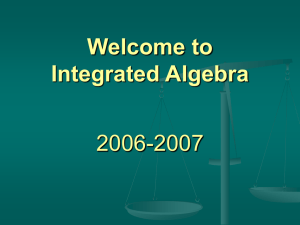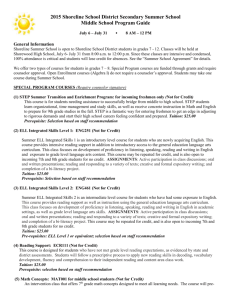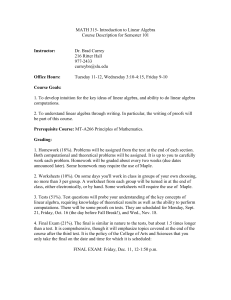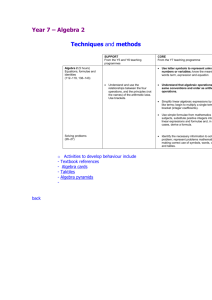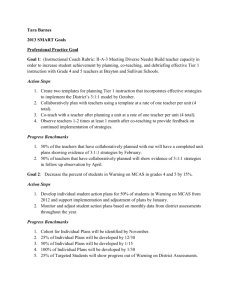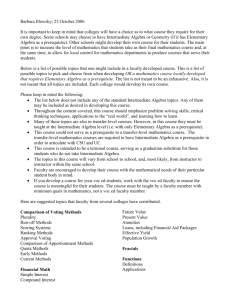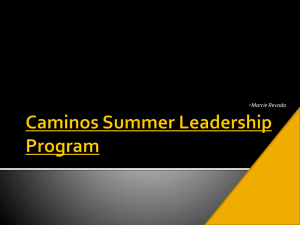Program of Studies - South Shore Educational Collaborative
advertisement
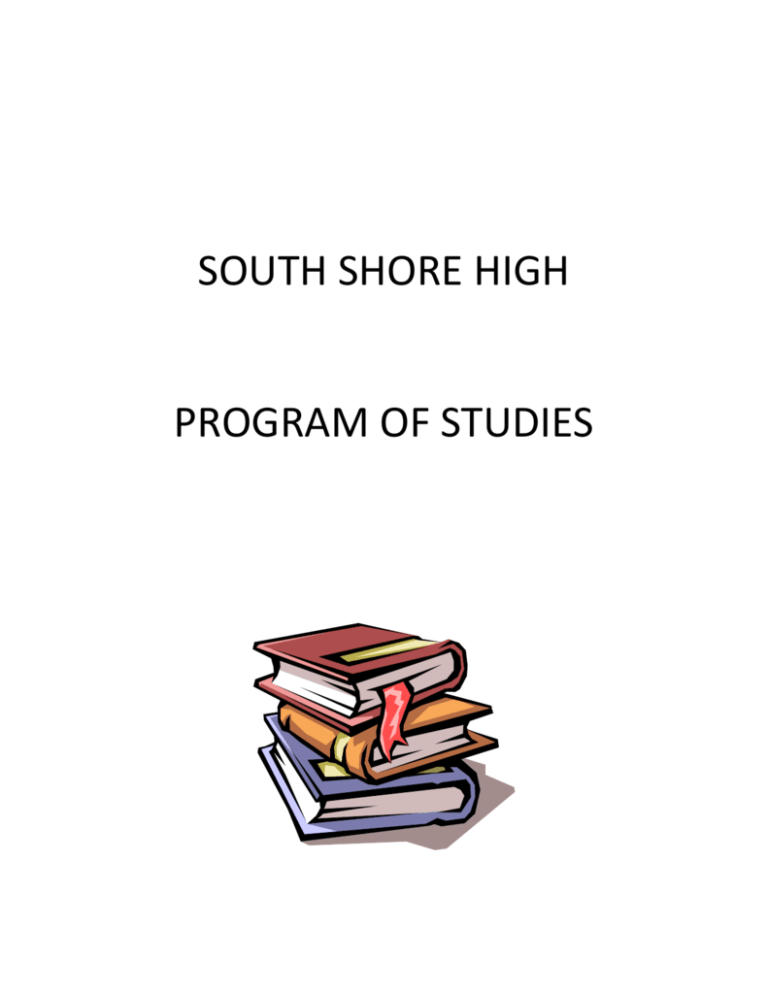
SOUTH SHORE HIGH PROGRAM OF STUDIES ENGLISH PROGRAM English I Full Year Course This course will focus on the fundamental skills of reading and writing. A variety of strategies will be utilized to facilitate competence in these areas. Comprehension skills will be taught through novels, short stories, plays, essays and non-fiction works, with an emphasis on MCAS preparation. Vocal skills will be developed through a PowerPoint presentation on a given piece of literature. Vocabulary skills and literary terms will be developed in conjunction with the reading materials. Process writing and five paragraph essays will be developed to analytically respond to literature. Several short and a few longer writing assignments will be given in response to reading materials. English II Full Year Course This course will further develop reading and writing skills. Students will be expected to identify more of the literary devices and incorporate them into longer, analytical essays. Two PowerPoint presentations will be assigned and presented orally to respond to longer literary pieces of writing. A required research project will be assigned to develop thesis statements and explore various sources in the development of a longer writing assignment. More emphasis will be put on SAT preparation and college bound assignments. Students will continue to develop speaking and listening skills through oral presentations. Writing will address varied audiences and sophistication in word choice, fluency, organization and conventions. English Foundations Full year course This course focuses on reading comprehension, grammatical principles, standard usage, mechanics, composition, literary skills and study skills. The course focuses on the skills needed to write well developed essays on novels and other literary genres. A small number of students are assigned to the course and instruction is differentiated based upon each student’s individual needs. English Language Arts (ELA) Full Year Course This course is taught to ninth through twelfth grade students. It incorporates academic supports and accommodations to insure that students on IEPs with diverse learning styles can access the full range of English Language Arts and Literacy Standards. Through readings of both classic and contemporary literature and text, students will develop the ability to experience, reason, evaluate, appreciate and understand. Students will be exposed to knowledge and perspectives from varying audiences and different cultures. Students will also develop the ability to research a topic, write essays, short stories, explore poetry, grow their vocabulary and work on oral speaking and listening skills. Writing Full Year Course This course is intended to help students become comfortable with the process of writing, find their voice through the written word and expand their skill levels. Throughout the course of the year, students will produce clear and coherent writing in which the development, organization and style are appropriate to the task, purpose and audience. Students will participate in the writing process and strengthen their skills by planning, revising, editing, rewriting and trying new and varying approaches. Students will work individually to build their own finished writing portfolios and will also work collaboratively with classmates on varying projects, such as group story writing and projects involving other forms of artistic and creative expression. Film and Literature Semester Course This course is designed to expose students to a variety of films dating from the early classics to more current films. The films are viewed and then discussed in the context of classic elements; universality, timelessness and content quality. An essay, involving the literary devices, is assigned for each completed movie. Ethics Semester Course This course is designed to allow students to explore and develop and sense of self and self in relation to others. Students will be expected to answer the question “What do I stand for?” as topics are presented and discussed in class. Through this class each student will develop a personal manifesto and put words to their values. This class will include a number of learning formats including class discussions on reading materials, project-based activities, reflections on multimedia presentations, community service projects, and a weekly class that is co-led by a school-based clinician as students look more deeply into how their values impact their decision-making. MATHEMATICS PROGRAM Math Foundations Full year course This course will focus on skill development and problem solving strategies as they relate to the Massachusetts Mathematics Frameworks. The emphasis will be on two strands; “Number Sense” and “Patterns, Relations and Functions”. In addition to building a solid foundation of skills in “Number Sense” and “Patterns, Relations and Functions,” the course will provide students with practice in applying fundamental mathematical concepts and techniques to practical problem solving as well as a sound preparation for Algebra and Geometry courses. Pre-Algebra Full Year course In this class students will prepare for the formal study of algebra. Some of the topics to be studied are positive and negative numbers, number theory (divisibility rules, prime factorization, GCF and LCM), solving equations and proportions, the metric system of measurement, problem solving, estimation, geometric concepts and solving for area and volume. Calculator applications are also taught. Integrated Math Full Year course This course is designed for students who need reinforcement of their basic mathematical skills before taking Algebra 1, but will be expected to pass the MCAS test in the tenth grade. Topics covered include patterns and sequences, statistics (reading and constructing graphical data), decimals and integers, equations and inequalities, exponents, factors, and fractions, ratios, rates, and proportions, and percents, as well as counting theory and probability. Geometry topics studied include angles, triangles and quadrilaterals (perimeter, area, Pythagorean theorem, trigonometric ratios, scale factors and similarity), circles (circumference and area), and properties, surface area and volume for prisms, cylinders, cones and spheres. Emphasis will be placed on verbal problems and test-taking practice. Algebra I Full Year course This course is the first of a three year sequence. It is a college preparatory course covering functions and their graphs, solving linear equations, functions, and systems of equations. Other topics covered include exponents, factoring, the Pythagorean Theorem, polynomials and probability. Geometry and computational skills are reviewed for MCAS preparation. Real life applications are emphasized. Geometry Full Year course In this class students will study the properties of geometric figures in a plane and in space. Inductive and deductive reasoning skills will be used in proving and clarifying various concepts studied. Angle relationships, parallelism and perpendicularity of lines and planes, and properties of polygons are major topics. The Pythagorean Theorem and its use in special triangles, circles, area, perimeter and volume are also major topics in the source. Congruence and similarity of polygons, transformations and constructions of figures are all studied with “hands on” activities. A strong background in algebra is recommended as algebra is used throughout the course. Algebra II Foundations Full Year course This course is designed for students who received a warning or did not pass the Math MCAS, or college-bound students who need additional work on the basic concepts covered in Algebra I before taking a higher level math course. This course will initially include the most common mistakes made when working problems in Algebra I and Basic Geometry topics included on MCAS tests. This course will then survey most of the topics covered in the regular Algebra 2 course, but in less depth. This course satisfies the graduation requirement to pass an Algebra II course if warning or failing scores are received on the Math MCAS. Prerequisite: Successful completion of Algebra I and Teacher Recommendation Algebra II Full Year course Topics studied in this course include graphs of relations and functions, analysis of linear functions and systems, systems of equations and inequalities, properties of real and complex numbers, probability and statistics, quadratic functions and equations, exponential, logarithmic, polynomial, and rational functions. Problem solving and real life applications are emphasized. The use of graphing calculators is taught. Advanced Math Full Year Course This course is designed to help students gain a deep understanding of the fundamental concepts and relationships of functions. Students will expand their knowledge of quadratic, exponential, and logarithmic functions to include power, polynomial, rational, piece-wise, and trigonometric functions. Students will investigate and explore mathematical ideas, develop multiple strategies for analyzing complex situations, and use graphing calculators and mathematical software to build understanding, to make connections between representations, and to provide support in solving problems. Students will analyze various representations of functions, sequences, and series. Students will analyze bivariate data and data distributions. Students will apply mathematical skills and make meaningful connections to life's experiences. Advanced Math is highly recommended preparation for students who plan to continue their formal education beyond high school. Prerequisite: Successful completion of Algebra 2 and teacher recommendation. HISTORY PROGRAM U.S. History I Full Year Course This course in American History will follow the development of our nation from Colonial times through Reconstruction. It will include an in-depth study of the founding documents that helped to shape American democracy as well as a close examination of the political, social, religious and cultural trends that defined the new nation. Alternative forms of assessment will evaluate students’ ability in a variety of areas while emphasis will be placed an analytical essay writing and approaching complex problems in American history with intelligence and understanding. Additionally, students will acquire and apply the fundamental skills needed to write a historical research paper. Student Learning Expectations: 1. Read, write and communicate effectively. 2. Utilize technologies appropriately and effectively. 3. Apply critical thinking skills. 4. Explore and express ideas creatively. 5. Participate in learning both individually and collaboratively. U. S. History II Full Year course After a brief review of United States History I this course will focus on the emergence of the United States as a world power and trace the impact on American society of events taking place in Europe and around the world. The course will also concentrate on the growth of the American economy and the many, varied reform movements that were organized to address the problems that accompanied the growth of this prosperous, modern nation as well as a close examination of the political, social, religious and cultural trends. Additionally students will acquire and apply the fundamental skills needed to write a historical research paper. Prerequisite: U.S. History I Student Learning Expectations: 1. Read, write and communicate effectively. 2. Utilize technologies appropriately and effectively. 3. Apply critical thinking skills. 4. Explore and express ideas creatively. 5. Participate in learning both individually and collaboratively. Prerequisite: U.S. History I World History I Full Year course This is an introduction to world history covering the period from 4000 BCE to the Middle Ages. This course is designed for the student to develop greater understanding of the evolution of civilizations and cultures as well as global processes, contacts, and interaction of different types of human societies. The course highlights comparisons among major societies from ancient civilizations in Asia, Africa, Europe and the Western Hemisphere. 1. Read, write and communicate effectively. 2. Utilize technologies appropriately and effectively. 3. Apply critical thinking skills. 4. Explore and express ideas creatively. 5. Participate in learning both individually and collaboratively. World History II Full Year course After a brief review of World History I, this course will focus on European History from the Renaissance to the present. Stress will be placed upon those European political, economic, intellectual, and cultural trends that have shaped the modern Western world with particular emphasis on the Renaissance, the Ages of Enlightenment and Reason, the French Revolution, and the wars of the 20th Century. Emphasis will also be placed on working with and interpreting primary documents, as well as examining prominent works of art and art movements of the age. Students will acquire and apply the fundamental skills needed to write a historical research paper. Student Learning Expectations: 1. Read, write and communicate effectively. 2. Utilize technologies appropriately and effectively. 3. Apply critical thinking skills. 4. Explore and express ideas creatively. 5. Participate in learning both individually and collaboratively. History of the 20th Century Full Year course* This course will focus on the events of the 20th century that led to the transition of the United States from an agrarian nation to one of the most technologically advanced and most powerful nation of the 20th century. Stress will be placed upon the world wars and the Cold War, the rise and fall of the Soviet Union as well as social, cultural, religious and economic trends of the century. Students will acquire and apply the fundamental skills needed to write a historical research paper. Student Learning Expectations: 1. Read, write and communicate effectively. 2. Utilize technologies appropriately and effectively. 3. Apply critical thinking skills. 4. Explore and express ideas creatively. 5. Participate in learning both individually and collaboratively. * This class meets in a 90 minute block for one semester Introduction to Biological Anthropology Full Year course Introduction to Biological Anthropology is a course that focuses on the evolutionary forces that have shaped, and continue to shape our species. Course work will explain the focus of each of the subfields of biological anthropology: paleoanthropology, primatology and human variation. This will include a brief history of the development of evolutionary thought, the major principles and mechanisms of biological evolution, the structure of the cell and the process of cell division in organisms, and the basic principles of biological heredity. The class will also trace the evolution of primates and outline the taxonomic classification of primates, the distinctive physical and behavioral characteristics of primates and the comparison of hominids with the other primates. Prerequisite: Biology I Introduction to Cultural Anthropology Full Year course In this course the student will be introduced to the basic concepts and findings of cultural anthropology, the systematic and comparative study of human institutions and behavior, and will achieve an understanding of the cultural diversity. The course covers the major specializations within cultural anthropology with an emphasis on the comparative study of contemporary cultures. The lectures, readings, and assignments for this course are designed to give an overview of the whole sub-discipline of cultural anthropology and its specializations including medical and linguistic anthropology. Government Theory Semester course This course will focus on the various institutions, groups, beliefs, and ideas that constitute United States politics. Students will gain an analytical perspective on government in general and on the comparative political climate between and among the States and the Federal Union. Students will gain an understanding of the constitutional machinations which bind the United States into a government. Students will learn and discuss the leading theories, and the individuals who gave rise to the United States Constitution. Students will also learn how to analyze and interpret basic data relevant to U. S. government, policy making, politics, and the electoral process. Special attention will be given to developing proper analytical and critical thinking skills of each student. Prerequisite: US History I or II Law, Policy, and Society Semester course Using the “Socratic Method”, this course is designed to introduce students to the general principles within the study of law. Students will investigate seminal case precedents, and develop arguments in support of their position. Students will examine the “social contract theory”, and its correlative argument for law, and whether we should “consent to be governed”. Students will also learn how the law applies to their everyday lives as citizens of the United States and of the Commonwealth of Massachusetts. Emphasis will be placed upon developing an understanding of the common law (case law), and the utilization of case studies and their impact on the evolution of law. Prerequisite: US History I or II Big History Full Year course History on the largest scale: the origins of the universe to the history of humanity and our unfolding present. An astronomer, geologist, biologist and historian trace the fundamental forces shaping change and continuity across time with an eye to how history and the historical sciences learn about the past. Through both online lessons and lectures and class discussions, students will become conversant with the major eras and turning points in the history of the universe, planet, life on earth and humanity. This course is meant to get students to see links between various branches of knowledge and to ground all their learning in the widest possible perspective. Historical and Geographical Geography Full Year course Cultural and Historical Geography, also known as Human Geography, covers a wide swath of human interaction with the land. Cultural Geography includes language, religion, medicine, cities, economics, entertainment, and much more. Historical Geography looks at the impact of geography upon historical events. But to understand and discuss these topics, we must first be able to answer the following questions: 1.Where am I? 2. What is over there? 3. How do you get there from here? SCIENCE PROGRAM Biology Full Year course This course explores the function and processes of cells, tissues, organs, and systems with various species of living organisms within populations, communities, ecosystems, and the biosphere. Students work with the concepts, principles and theories of the living environment. Students are expected to gain an understanding of the history and development of biological knowledge, explore the uses of biology in various careers, and investigate biological questions and problems related to personal needs and societal issues. Students will be prepared to demonstrate proficiency on the Biology MCAS exam. Introduction to Physics Full Year course This course explores the fundamental concepts and principles related to matter and energy, including mechanics, wave motion, heat, light, electricity, magnetism, and atomic physics. This course uses hands on activities to understand concepts such as velocity, acceleration, force, energy, momentum. Students will be prepared to demonstrate proficiency on the Introductory Physics MCAS exam. Environmental Science Full Year course In this class students will study the scientific principles, concepts, and methodologies required to understand the interrelationships of the natural world, to identify and analyze environmental problems both natural and human-made, to evaluate the relative risks associated with these problems, and to examine alternative solutions for resolving and/or preventing them. Students will participate in hand on activities and community service projects. Chemistry Semester course This theoretically based course examines the composition of various substances and the changes they can go through. The course is designed to expose students to the effect of quantum mechanics on everyday life. Particular attention is spent upon the interrelationship of particles and sub-particles of the atom. Attention is paid to how these particles touch our lives, from medicine, and the food we eat, to the clothes we wear, the games we play, and relative essential industrial applications. The periodic table and simple compounds are covered, as well as the basics of Chemistry, and general theories in Chemistry. Prerequisite: Biology 1 Physics Semester course This one semester course will cover the basic concepts underlying modern physics. Topics include the theories of Special Relativity and Quantum Mechanics, with an emphasis on the physical phenomena and experiments that led up to the origin of these theories. The course continues through a virtual and physical study of the applications of basic mechanical physical theory. Some attention will be placed in the examination of the fundamental principles relative to elegant theories such as “Super String Theory” and “Chaos Theory”. In addition to lectures, the course will make use of online content to permit the student to observe and experience simulations of realistic numerical problems in the field of modern physics. Prerequisite: Successful completion of Introduction to Physics and teacher recommendation. ART Art and History Full Year Course Students will engage in visual arts activities, based on a Discipline Based Art Education program wherein they will be able to practice creative art-making, be exposed to historical artwork and engage in critical discussions about art and its role in global cultures throughout history. Class is designed to be a structured opportunity for social-educational engagement. Students are encouraged to engage each other in discussion while engaged in the creative process when possible and appropriate. All students will engage in creative projects employing a variety of media; practice the implementation of concepts and ideas conveyed through artistic forms of expression from differing global perspectives; and will identify an art making activity as an acceptable leisure or coping skill. Most students will also make a visit to a museum, gallery or sculpture park; participate in the production of an art show; and utilize art-based vocabulary with accuracy. Some students will go on to explore visual arts as a possible future educational or vocational goal. TRANSITION SKILLS Full Year Course Students will meet for twenty minutes daily with their homeroom peers and teacher to participate in conversation and learning activities regarding the development of skills that will prepare them for life after high school. Students will engage in age-appropriate transition skills self-assessments in order to determine their level of competency in several areas of transition planning, including, but not limited to, understanding personal areas of interest, career awareness, interpersonal skills, independent living skills, understanding an IEP, and other aspects of self-determination. The outcome of these assessments will drive the students’ targeted areas of improvement when completing independently-driven modules. Students will engage in learning opportunities both in the classroom and in the community that are appropriate to each student’s targeted areas of growth. ELECTIVE OFFERINGS Physical Education Term course Various activities are offered including basketball, floor hockey, weight training, aerobics, yoga, walking, jogging, ping pong, wiffle-ball, and flag football. Physical fitness and proper nutrition are emphasized as necessary for maintaining good health throughout life, and physical activity is taught as a means of reducing stress and maintaining proper health. In addition to movement, students in this class develop critical team building skills necessary for positive group cooperation in the world of work, and post graduate activity pursuits. Some students will also be introduced to opportunities in their communities for pursuing academic service-learning, such as assisting in motor activities in the SSEC Community Program. Measures are taken to ensure the physical and emotional safety of all students. Mutual respect is encouraged, and students can feel free to participate and explore without the fear of failure, harm, or ridicule. Health Term and semester course offered In this course students will investigate a range of human interactions. Areas to be explored include anti-bullying strategies; making responsible decisions; communicating effectively; mental & emotional health; building self-esteem; adolescent relationships & responsibilities; the use, misuse & abuse of drugs, alcohol and tobacco; human sexuality; and peer pressure. Photography Minimum one term In this course, students will be exposed to the basic techniques of producing exceptional photographs. They will include elements such as artificial and natural lighting, and composition. Different genres of photography will be explored, including portrait, scenic, abstract, architectural and “street photography“. In addition, students will also be introduced to the work of famous photographers such as Ansel Adams, Diane Arbus, and others. Class projects may include production of a calendar using student work, hosting and art/photography show, and producing framed photos to be displayed in our main lobby. Music Class Term course This class is designed to expose students to a variety of music styles and to develop their vocal and instrumental skills. Students bring a variety of music to class via their iPods or the internet and share this music with the class through performance. The audience critiques the performance with supportive feedback. Students develop their ability to overcome "stage fright" and receive feedback during the year, which culminates in a spring talent show. This show is open to the program and to parents of the performers. Computer Applications A Minimum One Term This course is a broad introduction to the use of computers as tools for creativity, communications and organizing information to enhance work in other subjects. No previous computer experience is necessary. In addition to learning the technical fundamentals of computer use, students will build your skills in researching information, making appropriate ethical choices about the use of computers, and using technology to help learn independently. As time allows, the student will become familiar with computers and their peripheral devices as well as many types of software applications. These include use of scanners and digital photography. While becoming familiar with networking systems, sharing communications, and how to do research using the INTERNET, a variety of program applications covered may include word processing, spreadsheets, databases, desk-top publishing, computer aided drafting, computer graphics, web page design and construction, and various “utility” and anti-virus and anti-spam programs. Computer Applications B This course is a continuation of COMPUTER APPLICATIONS A for the student who desires to further explore software and peripheral devices included in the prerequisite course. Prerequisite: Successful completion of COMPUTER APPLICATIONS A Academic Support Class meets daily, minimum of one term The course is offered to a small group of students. The course emphasis is on study skills, time management, and work completion. Students are given direct instruction in managing class assignments, homework and long term assignments. Students have multiple opportunities to work with staff one-on-one on class assignments or homework. Enrollment in the course depends on the needs of the individual student. Academic Study Assistance One hour per day as needed This course is designed to support and assist the student in completion of assignments in other courses. The student will have a quiet area in which to work and access to a computer and other research tools, as needed. A special education teacher will oversee this class and be available for assistance with instruction. Prerequisite: Request of student or teacher Student Leadership Two hours per week, minimum one term This leadership council meets regularly with staff to review school-based policies, to problem solve and provide student feedback, and to recommend school initiatives. Students are expected to consult with peers in daily meetings and to bring their ideas and concerns to the leadership council. Involvement in Student Leadership is recommended by peers and approved by staff. Artistic Expression Minimum one term In this class students are encouraged to use the arts as a means to express thoughts and ideas. Students engage in artistic processes as a way to express emotions as well as to explore a variety of ways to engage in recreational time in a healthy and productive way. Students may create works of visual art, but will also explore performance and musical activities. This class is co-taught with a school-based clinician.

